
RUSSIA SANCTIONS: US & EU

The U.S. joined the European Union in expanding sanctions to target Russian Arctic and shale-oil projects and further limit financing to Russian state-controlled companies, a move to put pressure on Moscow as Ukraine negotiates a long-term peace plan and closer ties to the EU.
The energy sanctions announced Friday, widely expected in recent days, will prevent Western energy firms from providing technology and services—other than financial services—to five Russian energy majors' oil projects in the Arctic, deep offshore fields and shale, the U.S. Treasury Department said.
U.S. companies have two weeks to comply with the sanctions, which could impact partnerships such as Exxon Mobil Corp.'s pact with OAO Rosneft, one of the Russian energy firms targeted by the new measures.
The U.S. and EU also added OAO Sberbank, by far Russia's biggest bank, to the list of financial institutions and companies that Western companies and individuals are barred from lending to beyond the short term. The length of financing allowed to the Russian firms was reduced to 30 days from 90 days under previous rounds of sanctions.
In addition, several defense firms were put on the sanctions list, and the U.S. Treasury moved to restrict financing to Rostec, a sprawling defense and industrial conglomerate owned by the Russian state.
In extending its own sanctions on Russia and rebels in eastern Ukraine, the EU added 15 companies and 24 individuals to its blacklist, including people linked to the rebels and Russian officials and oligarchs, and Russian lawmakers. The list includes Sergei Chemezov, one of Russian President Vladimir Putin's known close associates and the chairman of Rostec.
Russian lawmaker and former presidential candidate Vladimir Zhirinovsky was also on the list.
The EU's sanctions indicated that companies and individuals are prohibited "to sell, supply, transfer or export, directly or indirectly, dual-use goods and technology" from nine Russian companies, including small-arms manufacturer JSC Kalashnikov, ammunition manufacturer NPK Technologii Maschinostrojenija, and state-owned companies OAO Almaz Antey and OAO NPO Bazalt.
Some legal experts said the new sanctions could jeopardize the contracts Western firms have in Russia.
Exxon agreed to pay for the majority of exploration costs for the Arctic, estimated at more than $3.2 billion, in exchange for a 33% stake in the venture. The deal has given Exxon unique access to a swath of Russia's Arctic larger than Texas, which could hold billions of barrels worth of oil and natural gas.
An Exxon spokesman said the company is assessing the sanctions.
In addition, Royal Dutch Shell PLC's shale project with Russia's OAO Gazpromneft could be affected by the new sanctions.
"We are taking actions to ensure we comply with all applicable sanctions or related measures," said Curtis Smith, a spokesman for Royal Dutch Shell. "We continue to review the potential impacts of sanctions on our business and engaging with the respective authorities to gain further clarity."
Eric Lorber, a lawyer at Gibson, Dunn & Crutcher LLP who advises companies on how to comply with sanctions, said, "It is unclear whether U.S. companies can fulfill certain contractual obligations such as payments to their Russian counterparts."
Companies "may be faced with a particularly difficult choice," he said, "violating the terms of their contract" or being subject to enforcement actions by the U.S.
But a senior U.S. administration official said that the sanctions could be lifted if Russia pulls back its forces and ensures the cease-fire deal takes root.
"The hope is that this round [of sanctions] can support the full implementation of a solid peace plan for eastern Ukraine," the official said.
Mr. Putin greeted the sanctions with a mixture of sarcasm and frustration, joking that EU travel bans on top legislators would leave them more time to spend with their constituents. But he didn't announce immediate retaliatory steps.
"When the situation is moving toward a peaceful resolution, steps are taken which are aimed at disrupting of the peace process," Mr. Putin told reporters in Tajikistan, where he was attending a summit with Asian leaders. "We've long been convinced that sanctions as an instrument of foreign policy are ineffective and practically never bring about their desired result."
The latest sanctions come as Ukraine on Friday agreed to delay implementing some elements of a trade deal with the EU that the Kremlin had opposed, heading off a threat of retaliation from Moscow.
The EU agreed to delay until 2016 the application of parts of Ukraine's Association Agreement with the EU, which Moscow fears could hurt its market. That compromise will allow Ukrainian President Petro Poroshenko to go ahead with ratifying the EU agreement as planned next week, a key issue for his supporters.
EU Trade Commissioner Karel De Gucht on Friday acknowledged that giving Russia a say over what was supposed to be a two-way trade deal between the EU and Ukraine might set a bad precedent.
"It's a very complicated situation. It's a war situation," Mr. De Gucht said. "If this can contribute to calming down the pressure, it's a good thing."
wsj.com





